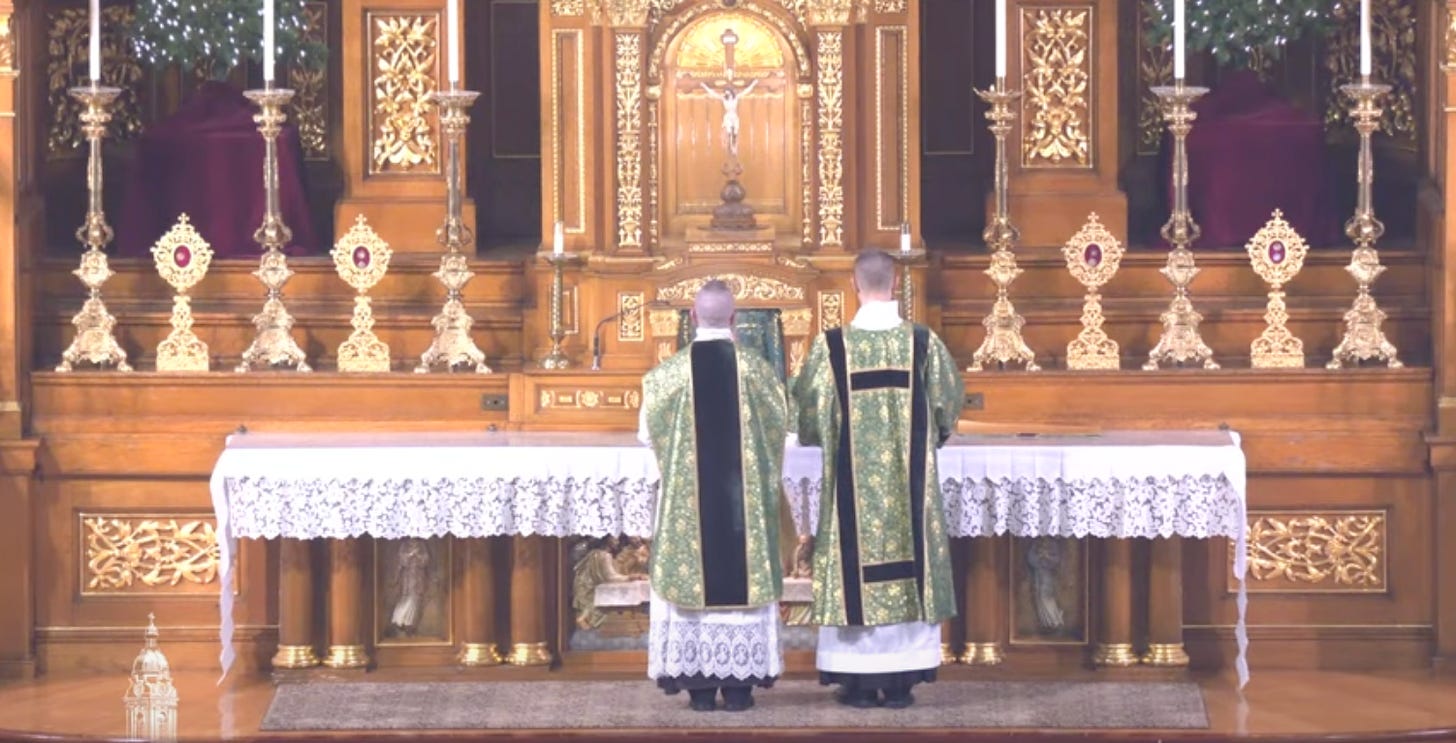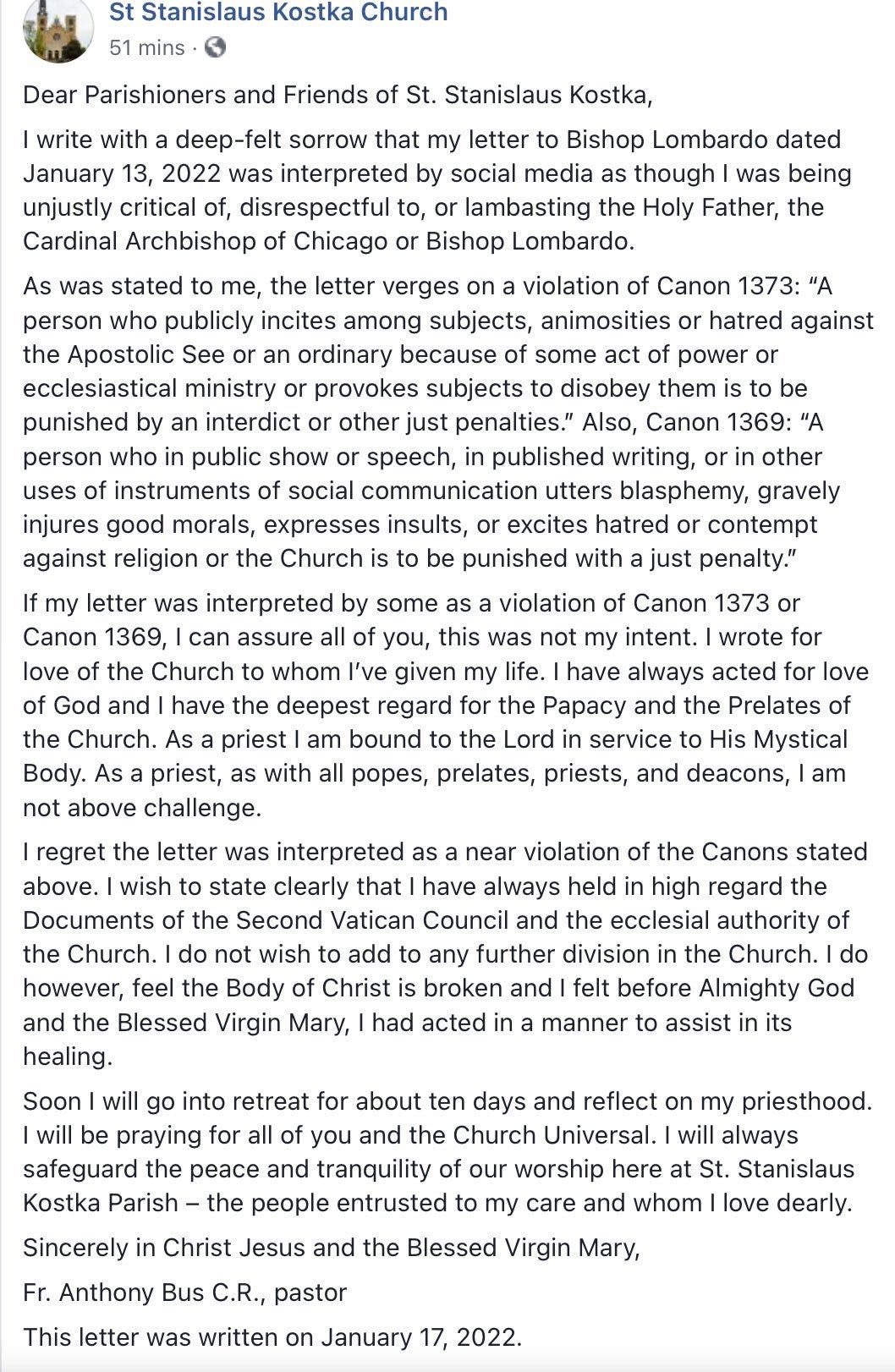
Updated: Parish responses to Chicago liturgy regs face different directions
News: 'Traditionis custodes'
Editor’s note: This report was updated at 7:30pm ET on 1/17, to reflect additional information regarding St. Stanislaus Kostka Church.
Restrictions on liturgy announced in the Archdiocese of Chicago three weeks ago have prompted diverse reactions among priests in the archdiocese, while the archdiocese itself has become a focal point for the U.S. implementation of instructions, issued by the Vatican’s worship office last month, on the celebration of the Extraordinary Form of the Mass.

Pushback on new liturgical policies suggests their implementation may become an ongoing issue within the Chicago archdiocese, even while one well-known parish has aimed to diffuse tensions over new archdiocesan rules.
“The Canons Regular are…committed to filial piety for the Archbishop of Chicago and the Bishop of Rome,” Fr. Joshua Caswell, superior general of the Canons Regular of St. John Cantius and pastor of Chicago’s St. John Cantius Parish announced in a sermon Jan. 16.
“In that spirit of unity, we will offer only the Holy Sacrifice of the Mass in its Ordinary Form, both in English and in Latin, on the first Sunday of each month, as well as on Holy Mother Church’s major feasts of Christmas, Pentecost, and the Triduum of Easter. These liturgies will be celebrated as only the Canons Regular can—and as the Council fathers truly intended,” the priest added.
Caswell’s parish, St. John Cantius, is among the most well-known in the Archdiocese of Chicago to offer the Extraordinary Form of the Mass, which was restricted last year by Traditionis custodes, a July edict from Pope Francis. In December, the Vatican’s Congregation for Divine Worship issued its own guidance on the pope’s motu proprio; the legal force of that guidance remains unclear.
In the Archdiocese of Chicago, Cardinal Blase Cupich announced in a Dec. 25 policy that parishes offering the Extraordinary Form, like St. John Cantius, would be required on the first Sunday of each month and on some holy days to offer only the Ordinary Form of the Mass. Caswell’s sermon affirmed that the parish would comply with the cardinal’s directives.
Caswell also affirmed that the parish, which has regularly offered both Extraordinary and Ordinary Forms of the Masses, had received permission to continue with some other liturgical practices prohibited by the new archdiocesan liturgical regulations, including the ad orientem celebration of the Mass.
“For the foreseeable future, we will continue to offer the Holy Sacrifice of the Mass both in its Ordinary Form and the Extraordinary Form. We will continue to pray ad orientem,” the priest said.
But the priest also acknowledged that, in his congregation, “many of you have endured a heavy cross and have been preoccupied by confusion, uncertainty, and sadness. Each of us shared a great deal in those emotions and we carried that same cross right alongside you.”
“When Pope Francis issued Traditionis custodes, some worried it might spell the end of the Canons Regular of St. John Cantius,” the priest added. “But let not your heart be troubled. We’re not going anywhere.”
“We are grateful that His Eminence Cardinal Blase Cupich has pledged to empower us to live our charism and to pursue our mission in accordance with his policy which implements the Holy Father’s motu proprio,” Caswell said.
“Today we remain—and are perhaps ever more so—committed to our charism, to our mission, and to each and every one of you,” the priest added.
“We will continue to praise God and lift souls aided by our renowned Sacred Music program. And we will continue to cultivate a culture of beauty in the Archdiocese of Chicago and beyond. Cantius will remain Cantius as best it can, and we are committed to continuing our ministry with you to restore the sacred in all things.”
The Archdiocese of Chicago was among the first U.S. dioceses to announce a comprehensive liturgical policy after the Congregation for Divine Worship issued its December guidance. Because Cupich is widely perceived to be close to Pope Francis and influential among many U.S. bishops, his policies on the Extraordinary Form of the Mass could portend the direction of liturgical policy in other U.S. dioceses.
Need a primer on terms like “Extraordinary Form” and “Ordinary Form?” Not sure what “ad orientem” means, or why it matters? Read our Latin Liturgy Lexicon here.
But while the Canons Regular expressed optimism about the future of liturgy in the archdiocese, the pastor of another Chicago parish struck a different tone.
In a letter posted last week on his parish website, Fr. Anthony Bus, C.R., pastor of Chicago’s St. Stanislaus Kostka Parish, said he had written to Cupich for permission to continue celebrating Mass ad orientem, a liturgical posture prohibited by the cardinal’s December policies.
“I will comply with [Cupich’s] directive that this is forbidden in his Archdiocese,” the priest wrote. “Even so, the Archbishop does not provide evidence that ‘Ad Orientem’ was abrogated at the Second Vatican Council. As I read Sacrosanctum Concilium and the Roman Missal the implication is ‘Ad Orientem’ was not abolished or prohibited - on the contrary.”
“The Holy Mass is the renewal of our fiat - a renewal of our covenant with the Lord and His Mystical Body,” the priest wrote in a Dec. 13 letter, addressed to a Chicago auxiliary, Bishop Bob Lombardo, CFR, who oversees the parish’s region within the archdiocese.
“Therefore our primary participation in the Holy Mass and the renewal of our sacred covenant to the Lord is that we offer ourselves ‘a living sacrifice holy and pleasing to God our spiritual worship,’ quoting St. Paul. We do this in union with the sacrifice of Jesus, for Jesus, through Jesus, and in Jesus - to the glory of the Father. The Sacred Mysteries offered, ‘Ad Orientem’ facilitates this so beautifully in preparation for Holy Communion, and always in anticipation of the Lord's coming at the end of all things,” he added.
Priests, bishops, and theologians comprising the “reform of the reform” liturgical movement have long maintained that the ad orientem posture of the Mass is the one presumed by the Church’s ordinary liturgical books. Many have called for a widespread return to that posture, which, they say, has had theological significance for millennia. And in recent years, some U.S. bishops have begun regularly offering Masses in the ad orientem posture, and encouraging priests to do the same.
Lamenting liturgical changes in the archdiocese and the universal Church, Bus wrote that “many faithful Catholics are being cruelly demoralized - thrown into confusion, which is something the pope admittedly takes joy in, and are purposefully being pushed to the fringe. There will be no place for our voices in the so-called ‘Synod on Synodality.’ This is something we know for certain. I don't mean to be offensive, but my words come from a place of having been offended over and over again for far too long. I speak for many because I listen to many who are away from the faith or trying hard to hold to the faith.”
Bus’ criticism of Pope Francis is likely to be noted by supporters of recent liturgical restrictions. Some Church-watchers have suggested that liturgical traditionalism, and even “reform of the reform” liturgical circles within the Ordinary Form, are pockets of undue criticism towards the pontiff, or resistance towards his initiatives.
The priest’s letter has been removed from his parish website, and the Archdiocese of Chicago has not commented on its substance.
Sources told The Pillar that Bus was directed to remove the letter Saturday, and summoned to meet with Cupich Monday morning.
Update: On Monday afternoon, Bus posted online a message to parishioners, telling them he had been informed his letter might have violated canonical prohibitions on inciting disobedience against a diocesan bishop.
“I regret the letter was interpreted as a near violation of the Canons stated above. I wish to state clearly that I have always held in high regard the Documents of the Second Vatican Council and the ecclesial authority of the Church. I do not wish to add to any further division in the Church. I do however, feel the Body of Christ is broken and I felt before Almighty God and the Blessed Virgin Mary, I had acted in a manner to assist in its healing,” the priest wrote.
“Soon I will go into retreat for about ten days and reflect on my priesthood,” Bus added.
The Chicago archdiocese has not responded to requests from The Pillar for comment.
Editor’s note: This report initially misspelled the name of Fr. Joshua Caswell. We misspelled it as “Cantwell,” a kind of accidental portmanteau of “Caswell” and “Cantius.” The error, which was repeated a whopping SIX TIMES in our report without catching our notice, has been corrected.






I am totally mystified by the hostility to the Extraordinary Form of the Mass. Many people, particularly the young, are disaffected from the Church and drift (or run) away from it. It seems to me that anything that keeps people coming back is something to celebrate and promulgate. Therefore, the Extraordinary Form would seem to me to have a proper place in the Church, and should be encouraged, not stamped out.
“many faithful Catholics are being cruelly demoralized - thrown into confusion, which is something the pope admittedly takes joy in, and are purposefully being pushed to the fringe. There will be no place for our voices in the so-called ‘Synod on Synodality.’"
Fr. Bus is wrong on both points. The pope does not take joy when Catholics are demoralized or thrown into confusion, and there is a place for his voice and the voices of others like him in the synod.